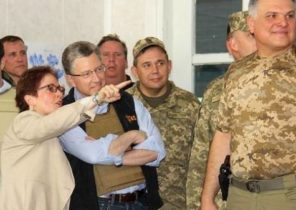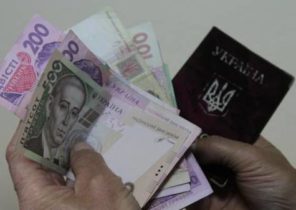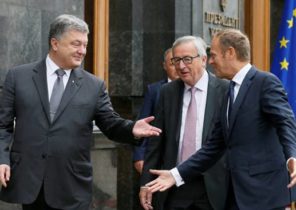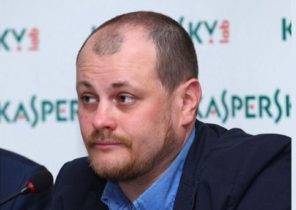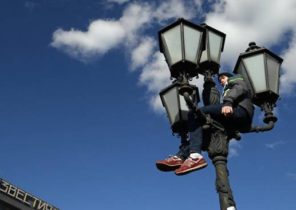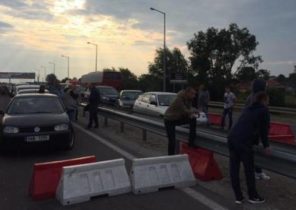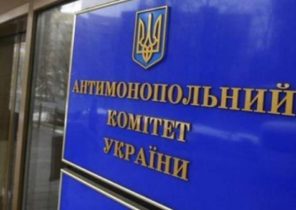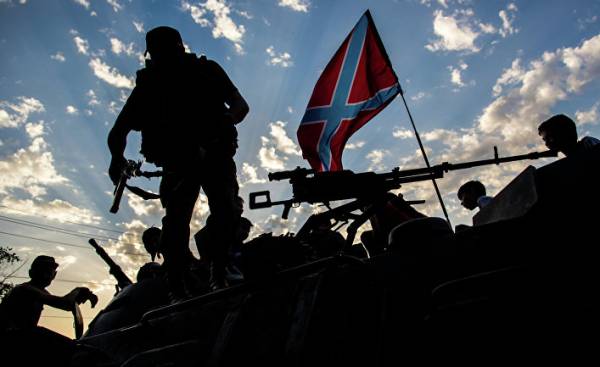
Last week in Ukraine was introduced a ceasefire. Not for the first time. To date, the truce was supposed to reign in the Ukraine for two years — but violence continues and the civilian population, whose homes are near the front, living as if in hell.
Correspondents HBL visited the frontline area and the city of Avdiivka, which until recently was under heavy fire. On the roof at any moment can drop a grenade, if not lucky. As it happened with the couple Sisaltavia.
BIM — black-and-white pooch, these are usually guarded by the courts in Eastern Ukraine. Now he could be dead. When a grenade hit the roof last night, he hid in his box and was miraculously saved from the rain of splinters.
Now he barks and wags its tail nervously. What was once a house turned into a charred Smoking ruins, and through the yard, covered with shingles, go firefighters, carrying a hose. They carefully step over the junk and go to the burned-out structure, whose centennial thick brick walls still stand in the smoke.
The house owners name is Alex and Natalia Chesalova. Alex hastily makes a makeshift sack with the surviving belongings.
“I went in the booth, BIM!” — priricipal it.
Dog lightning retracted into the box — only his head sticking out of it. A pair of sad eyes glide over the yard, which he guarded all his life. Everything has changed beyond recognition.
Natalia Chesalova looks at the ruins of his home still look. Eye dry. Almost everything she had was burned and she is unable even to cry.
“The clothes I’m wearing is all I have left,” she says and clasps his hands in a gesture that I have seen many times in the East of Ukraine.
This gesture means so. There’s nothing we can do about it.
A shell fell on the house last night. Natalia just in time to hide in the basement, and her husband Alex was still upstairs in the house.
“He likes to sit in the basement, — says Natalia, — I had to go down one. When he hit the ground, he was trapped, but ran a few soldiers, and managed to pull out”.
Same thing I heard from others. People of Donbass are tired all the time to run to the basement and hide from the shelling. Tired to repair their homes only to have them again destroyed. They are tired of this war that even stopped hiding from the bombing and sit in their kitchens, when bombs begin to fall.
Natalia and Alexey Chesalova live in Avdeevka. This city is located on the territory controlled by the Ukrainian troops, right along the front line near Donetsk. In early February the plant for several days was heavily shelled by the separatists, whose positions lie in two kilometers from here. Suffered about hundreds of homes and killed at least three civilians. This test couple Sisaltavia survived only for two weeks later to see how their house will burn to the ground after a direct hit in the roof.
“There was our hen house, — says Natalia, pointing to a steaming pile of junk — we had forty hens”.
It shows on the woodpile, where sit four covered in soot, huddled in terror of the chicken.
“It’s all who survived.”
At a distance of several hundred meters is a tank, squeezed between two residential houses. In an abandoned house in front of the tank is located a dozen Ukrainian soldiers. They immediately start screaming that I’m not allowed to photograph the tank.
Soldiers do not want to risk, fearing that separatists will know where their position. But probably those already in course: the front line is right outside the city, and in recent years both sides had fired enough of each other, to understand how the enemy had set up their forces.
“Sometimes the separatists, Ukrainian army sometimes. And both should stop shelling homes,” says Helen Chirwa, daughter of Natalia and Alexey Sisaltavia living on the opposite side of the street from my parents ‘ house.
She shows me a funnel in the garden — a large perfectly circular hole in the ground formed after a shell hit about two weeks ago. She Packed in a plastic container all the shrapnel and shells, which hit the area since the summer of 2014, when war broke out.
“The soldiers who investigated the crater said that the grenade was of 152 mm caliber,” she says and picks up the twisted piece of metal.
If so, then we are talking about the violation of the Minsk agreements, which allow for only the shells of 100 mm caliber. Helen Chirwa believes that this Treaty will not make sense until the international community begins to exert pressure on both sides, forcing them to implement all its provisions.
“Our are not able to end it. The rest of the world needs to put pressure on Russia, and Poroshenko”.
She grabs my hand, just as many others of those whom I meet in the zone of conflict, and says:
“The same can not be so that people don’t know what’s going on here? Why does nobody do anything?”
In may in Kiev will start the music festival of the Eurovision song contest. Meanwhile, in the East of Ukraine will be the third year of the war — war, which is actually a long time to go bloodless negotiations, the truce, according to the Minsk agreement began two years ago.
But the war continues. Houses of civilians on both sides are destroyed, stray bullets and shrapnel regularly take the lives of those who live near the front, and to move between Ukrainian and separatist territories becomes more difficult, because the tube and the so-called custom often takes several hours.
The gap between people is growing.
In late January, Ukrainian volunteer brigades have blocked railway communication between territories under the control of separatists and the Ukrainian government. This led to the energy crisis in Ukraine, as a large proportion of the country’s electricity is produced using coal. A very high percentage of the coal comes from areas controlled by separatists. To replace it is impossible, because the power plant is calculated on Donbass coal.
The question of the railway blockade was raised at the international level last week when the so-called “Norman Quartet”, consisting of Ukraine, Russia, Germany and France agreed on a new ceasefire in Eastern Ukraine. Then the foreign Minister of Germany, Sigmar Gabriel (Sigmar Gabriel) called on activists to end the blockade.
“The blockade inflicts double damage. It hurts those exports coal, and those who need coal to produce electricity,” stated Gabrielle.
But the activists that we met the guard of the point rail blockade in Bakhmut (before it was called Artyomovsk) say that indeed they are fighting corruption.
“Ukraine does not want to import coal from the occupied territories. Why do it? Because the Ukrainian elite makes. In many cases, the owner of the mines producing the coal, and the factories that buy the coal, — one person, the oligarch Rinat Akhmetov. We must end the rule of the oligarchs”, — said Valery, Mendeluk.
44-year-old Odessa businessman and father of three decided to go to Bakhmut, after he learned about the blockade from social networks. On huge banners written: “do Not Finance initial terrorists! To trade with the invaders to earn money for blood!”
The first road blocked volunteer battalion “Donbass”. Now the soldiers were gone and passed the blockade “Right sector” (an organization banned in Russia — approx. TRANS.) and a ragtag band of activists. Many came from other regions, such as Valery Bandaljuk. That the embargo creates an energy crisis in the country, is simply the price one has to pay, he said.
“It is not only coal this way is exported from the occupied territories. Transport and wood, and metals, and more. Why do we trade with the occupiers? Our country is corrupt, many officials make it fabulous on the illicit trade. That’s why we have to take matters into their own hands,” he says.
Activists take turns sleeping in a big army tent that was set on the other side of the road. Outside is very damp and cold, but inside hot as a bath, thanks to the so-called stove — simple stove with wood, which is still widely used in most armies of former Soviet republics.
I ask Banjaluka, I thought he has that the blockade was causing serious problems for ordinary people on both sides of the front.
“I feel sorry for those who live on the side of the separatists. They live under a dictatorship and therefore does not dare to say anything. But this does not mean that we, Ukrainians, must allow the oligarchs to plunder our country. Recently, gas prices and public services in Ukraine dramatically increased. Everything points to the fact that the powers that be have yet again found some cunning way to make money through intermediaries.”
The import of coal from the Donbass, too, were a breeding ground for corruption, according to Banjaluka. So in his eyes the train blockade is a particular way of struggle against the rotten system in which political and economic elites systematically divide the country’s resources among themselves.
So far, this system has consistently withstood all the trials endured by the Ukrainian state and revolution, and war.
In a sanatorium in Svyatogorsk about 50 kilometers North of the Town have been given shelter, about a hundred residents. The majority are women and children. Men were left to guard the house and to work in a coal plant, one of the largest in Europe. It still functions, although it is in some kilometers from the front line.
Olga Kirichuk four years, and she was not saddened by the fact that he was in this sanatorium. On the contrary.
“It’s great. So many children with which to play!”, she says.
I asked why she was here, and she calmly replies:
“The war”.
What does this mean?
“What are they shooting at each other.”
Women in the sanatorium are disappointed that the military situation had become for their children something normal.
“Our hallway is always collected in the bag and in the fridge — ready sandwiches in case we have to flee to the shelter. We ensure that the phone was always charged, recruited in the tank water, because it can turn off… If I Wake my nine-year-old daughter in the middle of the night, she knows what it is, I just need to say: “in the basement.” She just gets up and goes down,” says Tatiana Goruk.
This fall, she made an attempt to start another life outside of Ukraine. Together with her husband she moved to Nefteyugansk in Siberia, where three months worked as a cleaner.
“Our daughter had to live with my grandmother, while we were trying to settle in Nefteyugansk. The husband was a laborer, I cleaned the toilets. We worked overtime on evenings and weekends, seven days a week. And still it was impossible to make a living. Then we came back.”
Avdiivka is a city where people are reluctant to leave, even though he is so close to the front. But there still have a job thanks to coke-chemical plant. The result is a large part of the population, primarily families with children, constantly moving back and forth in the hope that the situation will finally calm down.
“I understand absolutely nothing in this war. It dragged on for three years, and still both armies remain in the same positions! If you manage to win the 100 metres, it is considered a great victory. What is this war?” — surprised Elena Kotlarova, which, together with the children moved to a sanatorium, but plans to return as soon as the conflict subsides.
“In the beginning was the sense that they fought. They wanted to secede from Ukraine and become independent. Now all have forgotten, for what really is a war. It’s just business”, — says Irina Mahler.
We talk, and women begin to relax. Heard a joke:
“Girls, second week without men!” — shouts one of the women.
“Men call every day and ask when we get home. Bored without us. We do not have in the kitchen and in bed” — picks up the other.
All laugh. The air felt relieved — a few seconds of a normal life.
In the East of Ukraine I often hear that war is mostly business. Many residents are convinced that the military leadership of both sides makes the war, for example, stealing and selling material values, belonging to the army.
In the town I meet with those whose relatives are fighting for the separatists. Nobody wants to name names or show pictures, they are afraid of reprisals. Meet and those who believe that Ukrainian troops are too close to their homes, but they don’t want to talk about it publicly for the same reasons.
Hard to know who actually sympathize with people. If you ask the residents of Avdiivka, almost all respond that they don’t care who is right and who is wrong. They just want the war over as soon as possible to “policy” finally agreed.
“I am a Ukrainian citizen, pay taxes in this country, and the Ukrainian state is obliged to protect me. Troops of the Ukrainian army in Avdeyevka are, but so what? I still had to run back to work under a hail of bullets. They need to find a political solution”, — says Elena Dyachkova, who lives on the outskirts of Avdeevka. In her house the shells hit five or six times. The last time this happened in late January.
We hear the crackle of gunfire. Front a mile away.
Neighbor Diachkova Maria Kosacek was forced to move into the house next door, because the roof of her house took some damage, which she and her small pension can’t fix. I met her on the street, when we talked with the local humanitarian organization “Revival”. Kosacek got a big plastic bag with blankets and linen.
“We need this. Our house is very cold in the morning, only seven degrees,” says Kosicek, low aunt in a too big jacket, buttoned pins.
She’s skinny and hunched, with unexpectedly large rough working fists. She worked as a cook at one of the factories in the nearby town of Yasynuvata.
“I was born in 1940 during the war. And die during another. A little more, and my heart will not stand. Before the war I had no heart problems, but now I often encounter them”.
She introduces us to a frozen house. Daylight enters the hall through the large hole in the roof. Sofa, barely covered with polyethylene, is the only thing that reminds you that this room is full of dust and trash that once was home.
Maria Kosacek looks at me, pressing his gnarled fist to his chest.
“You know that sound when they shoot from the “Grad”? Such a whistling. I hate him. Know how it hurts, to hide under the bed with a beating heart, that it is almost impossible to breathe, and it knocks and knocks, and it is impossible to calm him down?”
She looks at me.
“You know?” she asks with eyes full of tears.
I know how sound the shells of “Grad”. But what is it like to hear this whistling sound in your own home, not knowing that gets to you or not, — no, I do not know.
A few kilometers South of the Town dug the Ukrainian army. The narrowest place between Ukrainian and separatist positions is only about 350 metres.
In the middle of the front line — an open field covered with dazzling white snow, which literally invites you to ski. All is quiet. The only reminder of the war — gnarled silhouette of the Donetsk airport on the side of the front, the same one that recently had visitors during the Cup of Europe on football in 2012. Today the airport completely bombed, burnt and good for nothing. But for the separatists conquered the airport is one of the most important spoils of war.
“Over there, far away, sits a sniper. They’ve got a gun… and there’s another sniper. They usually work from nine in the morning until about lunch,” says Anton Boyko, who is on duty with binoculars on top.
The observation tower is lined with sand bags. On the wall hangs a beautiful picture of the virgin Mary with the infant embroidered cobalt blue and turquoise.
Smartly have no weapons. The main front line is a bit out of the way, and in the last days it was quiet. But a few days in late January and early February, this position was subjected to continuous shelling.
“They managed to get into our kitchen. Just luck that no one was there,” — said Maxim Ben. Dressed in a camouflage uniform, he sits behind a loaded gun at another lookout position near the first.
Most of the soldiers are busy with household chores: washing clothes, chopping wood, preparing dinner. On the shelves of the hoppers are large glass jars with square pieces of white salt-cured pork fat that is fat that is put on sandwiches.
In the room where the officers conduct the meetings, the walls are covered with pictures that children sent to the soldiers. One picture depicts a happy Cossack with a pigtail, who raised his finger up, and the inscription on top reads: “Glory to Ukraine”. Under the Cossack hangs incredibly detailed picture of the tank, the plane shooting bombs and the text: “No to war”.
Anton Boyko, too, believes that this war is not worth fighting.
“This war is incomprehensible. It is artificial. If we, ordinary people, was responsible for the negotiations, the war would have ended long ago”.
He makes a gesture towards the position of the separatists on the other side of the field.
“They think that Putin will help them. And he won’t do it. But I have no hatred for those who are on the other side. I am from Artemovsk (Bakhmut), I know those places, I have friends in Donetsk. They are also against this war.”
Note: reporters HBL wanted to visit and separatist-controlled territory, but has not received permission from local authorities.
